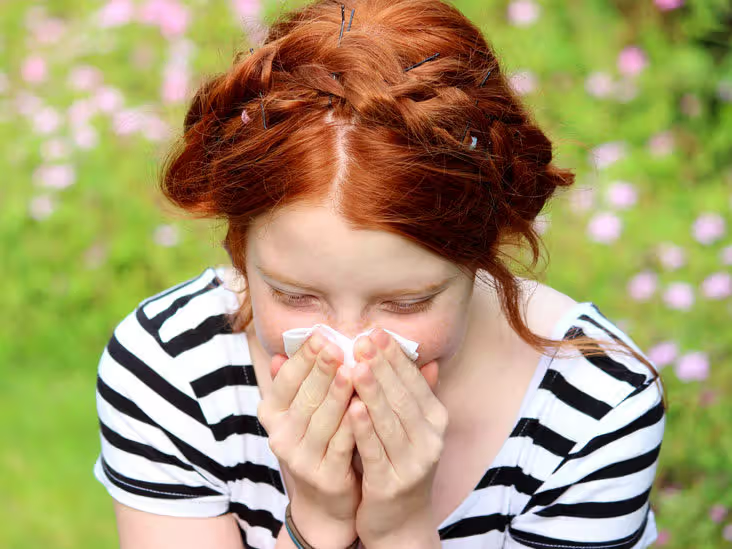What Exactly is Hay Fever?
If you find yourself constantly sneezing, coughing, or dealing with itchy, watery eyes during certain times of the year, you may be experiencing hay fever (also called allergic rhinitis). This condition arises when your immune system mistakenly identifies harmless airborne particles—such as pollen or mold spores—as threats.
In response, your body releases histamines, chemicals meant to defend against invaders but which also trigger those frustrating allergy symptoms. One particularly bothersome symptom is the persistent cough that often accompanies hay fever. While this cough isn’t contagious, it can be incredibly irritating—both for you and those around you.
Below, we’ll explore the causes, symptoms, and most effective treatments for a hay fever cough, along with prevention tips to keep it at bay.
Recognizing Hay Fever Symptoms
Since hay fever is often seasonal, symptoms tend to flare up when plants bloom or mold spores increase. However, if you’re sensitive to indoor allergens (like dust mites or pet dander), symptoms can persist year-round.
Common signs of hay fever include:
- Persistent coughing
- Frequent sneezing
- Itchy or runny nose
- Nasal congestion
- Sinus pressure or pain
- Watery, red, or itchy eyes
- Reduced sense of smell or taste
Unlike a cold or flu, hay fever symptoms appear quickly after exposure to allergens and usually subside once the allergen is removed.
Why Does Hay Fever Cause a Cough?
A hay fever cough is primarily triggered by postnasal drip. Here’s how it happens:
- Allergen Exposure – Pollen, dust, or mold enters your nasal passages.
- Mucus Overproduction – Your body produces thin, watery mucus to flush out the irritants.
- Postnasal Drip – Excess mucus drips down your throat, causing irritation.
- Cough Reflex – The “tickle” in your throat leads to persistent coughing.
This cough tends to worsen at night because lying down makes it harder for mucus to drain properly.
Additionally, if you have asthma, allergens can tighten your airways, leading to wheezing, chest tightness, and a dry cough.
Common Hay Fever Triggers
Seasonal Triggers (Spring/Fall)
- Tree pollen (early spring)
- Grass pollen (late spring/summer)
- Ragweed pollen (fall)
- Outdoor mold spores (damp weather)
Year-Round Triggers
- Dust mites (bedding, carpets)
- Pet dander (cats, dogs, birds)
- Indoor mold (bathrooms, basements)
- Cockroach allergens
Diagnosing a Hay Fever Cough
Doctors can often distinguish a hay fever cough from an infection by examining mucus consistency:
- Allergy-related mucus – Thin, clear, watery
- Infection-related mucus – Thick, yellow/green
Your doctor may also ask:
- When symptoms occur (seasonal vs. constant)
- Possible allergen exposures
- Whether antihistamines provide relief
For severe or unclear cases, an allergist can perform skin prick tests or blood tests to identify specific triggers.
Effective Treatments for Hay Fever Cough
1. Medications
- Antihistamines (e.g., Zyrtec, Claritin, Benadryl) – Block histamine release.
- Decongestants (e.g., Sudafed, Afrin) – Reduce nasal swelling.
- Nasal corticosteroids (e.g., Flonase, Nasacort) – Decrease inflammation.
- Leukotriene inhibitors (e.g., Singulair) – Help with asthma-related coughs.
2. Home Remedies
- Steam inhalation (hot showers, humidifiers) – Loosen mucus.
- Saline nasal rinses – Flush out allergens.
- Honey & warm tea – Soothe throat irritation.
- Air purifiers – Reduce indoor allergens.
3. Long-Term Solutions
- Allergy shots (immunotherapy) – Gradually desensitize your immune system.
- Sublingual tablets (under-the-tongue allergy treatment).
Preventing Hay Fever Cough
- Monitor pollen counts (stay indoors on high-pollen days).
- Keep windows closed during allergy season.
- Shower after being outside to rinse off allergens.
- Use hypoallergenic bedding to reduce dust mites.
- Vacuum regularly with a HEPA filter.
When to See a Doctor
If over-the-counter remedies don’t help, or if you experience:
- Severe wheezing or shortness of breath (possible asthma).
- Chronic sinus infections.
- Persistent fatigue or sleep disruption.
An allergist can provide specialized testing and advanced treatments.
Final Thoughts
A hay fever cough may not be dangerous, but it can significantly impact your quality of life. By identifying triggers, using the right medications, and making simple lifestyle adjustments, you can minimize symptoms and breathe easier.
